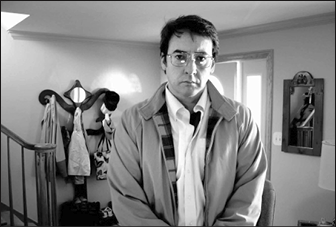By Steven Snyder
Grace is Gone
Written and Directed by James C. Strouse
Now showing at Landmark’s Sunshine Cinema
143 East Houston St., between 1st and 2nd Avenues
(212-330-8182, landmarktheaters.com)
For a story so well stocked in tears and turmoil, there’s a surprising lack of melodrama to be found in “Grace is Gone.” Instead, this sparse, subtle story, which took the Sundance Film Festival by storm last January and was quickly snatched up by the Weinstein Company as one of its Oscar heavyweights, is less a movie about the dead than the living; less about the horrors of war than a bruised and confused homefront.
Occasionally, we get a glimpse of just how frightened and frantic this trio of average Americans truly are, in the way a widowed husband calls his own answering machine to hear the voice of his dead wife — a soldier killed in Iraq — or in the way his daughter becomes terrified that he might lose his job, so obviously unprepared for the far more devastating news her father has yet to tell her.
Yet for all this fear, this micro-tragedy so avoids commenting on the larger ramifications of the Iraq War — the conflict in which Heidi (Shelan O’Keefe) and Dawn’s (Gracie Bednarczyk) mother, and Stanley’s (John Cusack) wife, is fighting — that its detachment almost becomes a point of suspense. By the film’s third act, our curiosity has become palpable: Will it or won’t it take a stand on the legitimacy of the mission?
And so it is late one night, mid-road trip, with one daughter asleep in the back seat of the family S.U.V. and the other serving as dad’s co-pilot, that writer-director James Strouse gingerly presses the point. The daughter, unaware of her mother’s demise, asks her father about the news reports she’s been seeing (even though he has forbidden her to watch the nightly news), reports that claim America went to war with the wrong country, implying that mom is fighting in vain.
Her dad — who until this point has found himself unable to tell his children the horrifying news, opting instead to load them in the car and hitting the road determined to give them a good time at their favorite amusement park — carefully considers the point. He tells her that she can’t put too much thought into such a question, that she must have faith in the justness of the cause, and the nobleness of her mother’s mission.
But what if it’s an unjust mission, she asks?
“Then we’re all lost.”
In many ways, Stanley’s low-key response — a far cry from his brother’s (Alessandro Nivola) angry tirades against the president, the war, and all of those saps who support it — parallels the way in which “Grace is Gone” stands apart from Hollywood’s other “war on terror” films. It is almost completely uninterested in such topics as overthrown tyrants or faulty intelligence; instead it seeks to focus on those everyday Americans who spend their days going to work and school, not watching Fox News or protesting in Union Square — the ones being directly affected by a war that most of the country can conveniently ignore.
Thankfully, Strouse doesn’t simplify the story, nor pander to the audience, by concocting a series of easy answers out there on the open road. The car conversations don’t pretend to be anything profound — except perhaps for that semi-conscious, late-night, four-line conversation mentioned above — and that amusement park doesn’t hold any secrets either. Instead, in the film’s deliberate lack of assuredness, Strouse is suggesting something else entirely: The war is what it is, the pain it’s causing can’t be escaped or minimized and, like Stanley, all we can do now is hope and pray that all this — the mounting caskets, the spouse’s broken hearts, the children’s shattered dreams — has been worth it.
A crowd of 3,000 people waited to get into the new Apple Store on W. 14th St. last Friday.


































